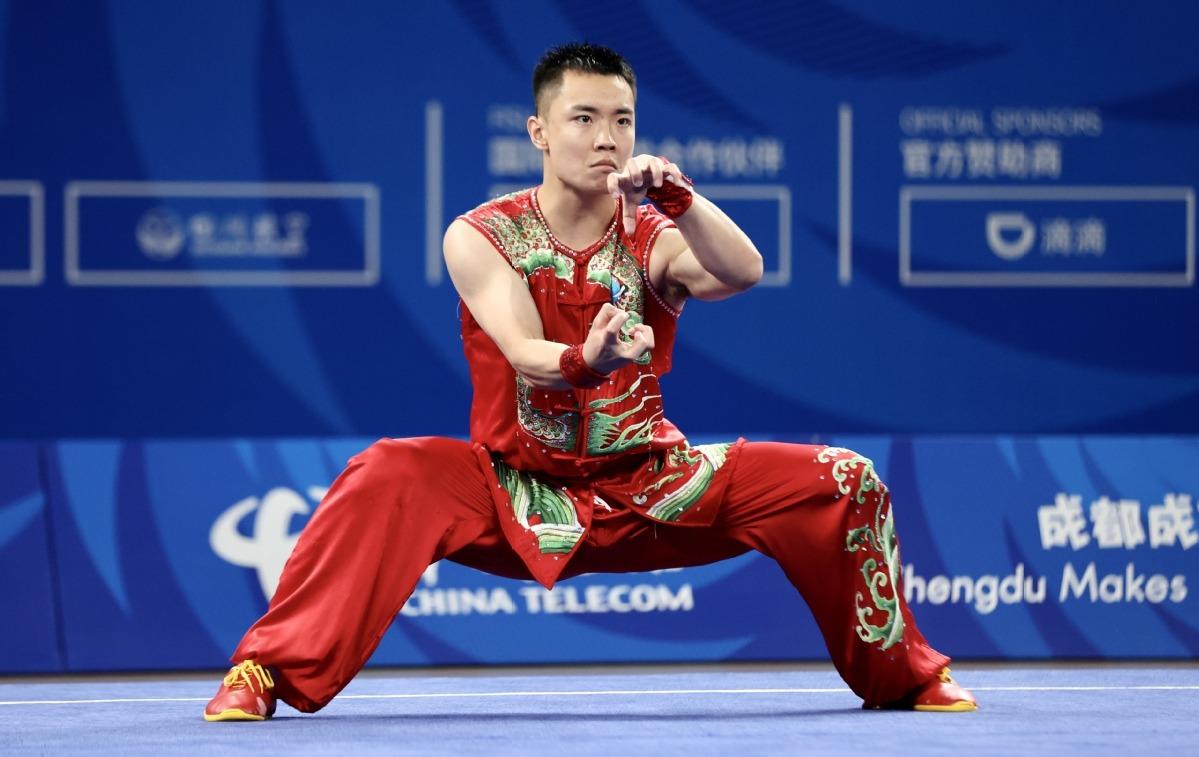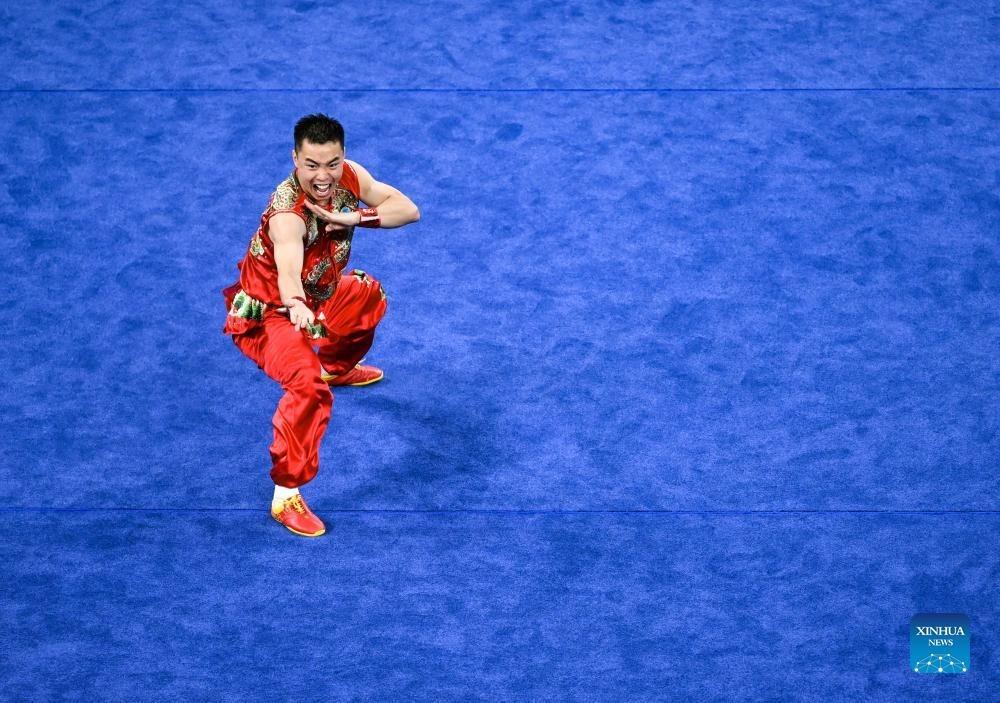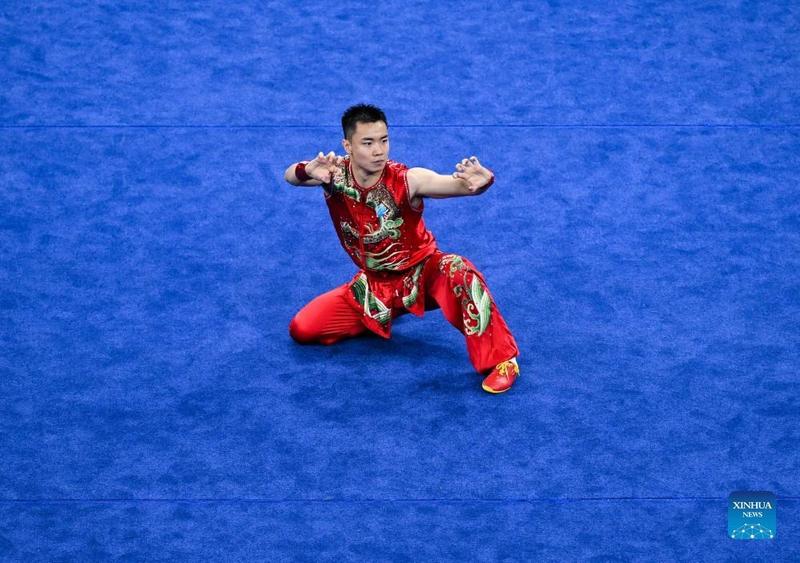 Cao Maoyuan wins the first gold medal at the 31st FISU World University Games with victory in the Men's Nanquan of Wushu tournament in Chengdu, on July 29, 2023. (WEI XIAOHAO / CHINA DAILY)
Cao Maoyuan wins the first gold medal at the 31st FISU World University Games with victory in the Men's Nanquan of Wushu tournament in Chengdu, on July 29, 2023. (WEI XIAOHAO / CHINA DAILY)
Chinese wushu athlete Cao Maoyuan outperformed all others in men's Nanquan to snatch the first gold medal of the Chengdu FISU World University Games on Saturday morning.
Cao, 25, a student from Chengdu Sport University, dressed in a red outfit with green dragon picture, stole the show on the carpet as the local audience warmly cheered for him.
"I was a little nervous and excited in the beginning, because it was my first appearance at the Games," Mao said after the competition.
"I'm glad that I secured the first gold of the Games. I believe I'll do better in the next competition."
Nanquan, or Southern Fist, is part of Taolu, which comprises of styles that originated and are popular in the southern banks of the Yangtze River
The 31st FISU Games held from Friday to Aug 8 in Chengdu has attracted 6,500 student-athletes from 113 countries and regions. Chengdu is the capital of Southwest China's Sichuan province.
It's the second time that wushu has been added to the FISU Games after its debut in 2017.
Wushu, or kungfu, is the collective term for the martial art practices which originated and developed in China.
ALSO READ: Built to last
 Cao Maoyuan of China competes during the Wushu Men's Nanquan at the 31st FISU Summer World University Games in Chengdu, southwest China's Sichuan province, July 29, 2023. (PHOTO / XINHUA)
Cao Maoyuan of China competes during the Wushu Men's Nanquan at the 31st FISU Summer World University Games in Chengdu, southwest China's Sichuan province, July 29, 2023. (PHOTO / XINHUA)
Wushu is categorized into two main categories, namely Taolu (Routines Competition) and Sanda (Free-Fighting Competition). Athletes will compete for a total of 20 titles in Taolu and Sanda in Chengdu.
Nanquan, or Southern Fist, is part of Taolu, which comprises of styles that originated and are popular in the southern banks of the Yangtze River. It is characterized by low stances with fewer leg techniques and a focus on short, powerful arm strikes often accompanied by vocal articulation, according to the International Wushu Federation.
The routines at the Chengdu Games include men's changquan (long fist), daoshu (broadsword), gunshu (cudgel), nanquan, nangun (southern staff), taijiquan (tai chi) and taijijian (tai chi straight sword) as well as women's changquan, jianshu (straight sword), qiangshu (spear), nanquan, nandao (southern broadsword), taijiquan, and taijijian.
Sanda is a modern unarmed combat sport that developed from traditional wushu techniques, and primarily makes use of punching, kicking, throwing, wrestling and defensive techniques.
ALSO READ: Shared future in spotlight as games open in Chengdu
 Cao Maoyuan of China competes during the Wushu Men's Nanquan at the 31st FISU Summer World University Games in Chengdu, southwest China's Sichuan province, July 29, 2023. (PHOTO / XINHUA)
Cao Maoyuan of China competes during the Wushu Men's Nanquan at the 31st FISU Summer World University Games in Chengdu, southwest China's Sichuan province, July 29, 2023. (PHOTO / XINHUA)
In Chengdu, Sanda competition includes four weight categories for men and two weight categories for women.
China has sent eight wushu athletes to compete at the Chengdu Games.
The Chengdu FISU Games was postponed twice due to COVID-19. In order to mitigate the effect on student-athletes, the International University Sports Federation broadened the eligibility requirements. It allows current university students aged between 18 and 27, as well as graduates from the academic years of 2020-22, to participate.
Athletes will be competing for 269 gold medals across 18 sports, which include archery, gymnastics, athletics, badminton, basketball, diving and fencing.
The Chinese delegation boasts 411 are student athletes from across the nation who will vie in all 18 competitions at the Games.


